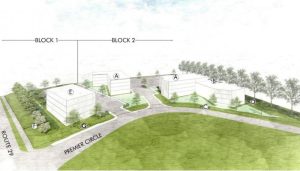
The Charlottesville Area Community Foundation has made the largest grant in its fifty-four-year history—$4.25 million to Piedmont Housing Alliance to purchase the former Red Carpet Inn on Premier Circle, off Route 29, in Albemarle County.
In this transformational project, Piedmont Housing will collaborate with several housing-centered nonprofit partners—including Virginia Supportive Housing, Thomas Jefferson Coalition for the Homeless, and PACEM—to operate the site as safe, non-congregate emergency shelter while it is redeveloped to create 80 permanent supportive housing apartments and approximately 60 additional affordable apartments. This grant is the first awarded by the Community Foundation’s new program, Investing for Local Impact, which uses creative financial tools to reimagine solutions to our most pressing problems.
A free online public event, April 15 from 12 to 1 p.m., will provide more information on the project and how community members can help. Register here.
“We’re excited to make a deeper impact on the historically intractable problem of homelessness,” Eboni Bugg, the Foundation’s director of programs, said. A 2012 Foundation grant to The Crossings at Fourth and Preston, also developed by Virginia Supportive Housing, helped to significantly cut the number of people experiencing chronic homelessness. Now, the Premier Circle redevelopment seeks to bring that number to zero.
“We have been listening to the community,” Bugg said. “And now we are partnering with area nonprofits to reimagine a hotel into a solution, one that puts the most vulnerable members of our community first.”
Bugg said the partnership evolved from a round of COVID-response grants. Traditional, close-quarter shelters were a health hazard. “The costs of maintaining people in hotel rooms was extremely expensive without providing a long-term solution,” she said. “So we kept talking with our nonprofit partners and realized that we had to invest in a different way.”
The grant, most of which comes from the Foundation’s Community Endowment, is “recoverable,” meaning as each phase of the project is completed, a portion of the funds will be returned to the Foundation in order to be reinvested in future projects. Toward that end, the final phase of the project includes developing the Route 29 frontage as a small subdivided portion of the site for future commercial use.
Housing is a fundamental human right, and its absence is a public-health crisis that negatively impacts all of us. “By standing with our neighbors most in need,” Brennan Gould, the Foundation’s president and CEO, said. “we create a region where everyone can thrive.”
Learn more: 12 Questions about the Collaboration to End Chronic Homelessness